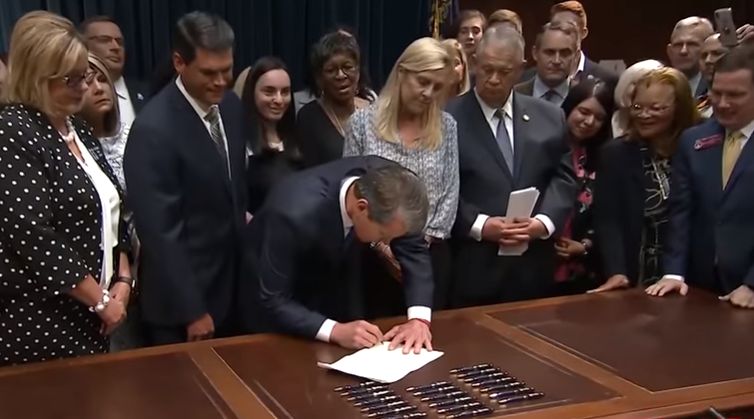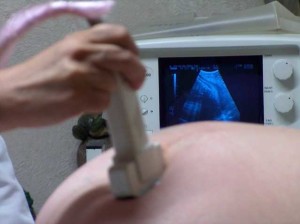 ATLANTA, Ga. — Republican Georgia Gov. Brian Kemp signed a bill into law on Tuesday that requires abortionists to first check for a heartbeat before being permitted to kill an unborn child, but with the stated “compromise” exceptions of rape, incest, the life of the mother or when the pregnancy is deemed “medically futile.”
ATLANTA, Ga. — Republican Georgia Gov. Brian Kemp signed a bill into law on Tuesday that requires abortionists to first check for a heartbeat before being permitted to kill an unborn child, but with the stated “compromise” exceptions of rape, incest, the life of the mother or when the pregnancy is deemed “medically futile.”
House Bill 481, also known as the “Living Infants Fairness and Equality (LIFE) Act,” mandates that “[n]o abortion is authorized or shall be performed if an unborn child has been determined … to have a detectable human heartbeat.”
It also clarifies in regard to Georgia homicide law, “For the homicide of an unborn child, the right to recover for the full value of the life of such child shall begin at the point at which a detectable human heartbeat … is present.”
The proposal passed both the House and Senate in March, and moved to Kemp’s desk, where it was expected to be signed.
“This bill is a compromise. It does not overturn Roe v. Wade,” explained bill co-sponsor Ginny Ehrhart, R-Powder Springs, during a Fox & Friends broadcast last month. “[I]t balances the rights and interests of the mother with the rights of that unborn child. It’s a balance.”
She noted that the bill contains exceptions for rape, incest and life of the mother.
“Recognizing that those things are important to upholding the rights of those women, we have included that language in the bill,” Ehrhart stated.
Co-host Steve Doocy then asked the lawmaker if, in the eyes of those who crafted the legislation, a heartbeat is the marker for when personhood begins.
“Exactly. Yes.” Ehrhart replied, “For centuries, the heartbeat has been the discernible, tangible indication of life. The absence of a heartbeat indicates death. The presence of a heartbeat indicates life. That is what this bill is attempting to. That is how we are seeking to define personhood.”
“It shall be the policy of the State of Georgia to recognize unborn children as natural persons,” the bill reads. “As used in this chapter, the term ‘child’ means child or children, including any unborn child with a detectable human heartbeat …”
View Ehrhart’s comments in full here.
“Georgia is a state that values life,” Kemp said moments before signing the bill Tuesday morning. “We protect the innocent. We champion the vulnerable. We stand up and speak for those unable to speak for themselves.”
“The Life Act is very simple but also very powerful: The declaration that all life has value, that all life matters and that all life is worthy of protection,” he stated.
Kemp outlined that he is aware of the opposition to the bill and the likelihood of a lawsuit, be feels that he must do what is right.
“I realize, like the others have said, some oppose this legislation. I realize that some may challenge it in the court of law. But our job is to do what is right, not what is easy,” he said to those gathered.
“We’re called to be strong and courageous,” Kemp declared, referring to the words of Joshua 1:9. “And we will not back down. We will always continue to fight for life.”
As previously reported, Ohio Gov. Mike DeWine signed the “Human Rights and Heartbeat Protection Act,” into law last month — a similar bill that includes exceptions for the health or life of the mother.
“The essential function of government is to protect the most vulnerable among us, those who do not have a voice,” he stated. “Government’s role should be to protect life from the beginning to the end, to protect those who cannot protect themselves, such as the elderly, the unborn, those who are sick, those who have a disability, those who have a mental illness or an addiction.”

When asked about the courts striking down similar bills, DeWine said that he views the legislation as a “vehicle” for the U.S. Supreme Court to potentially revisit its rulings on abortion, and with the hope that legal precedent would be modified or overturned.
“We respect the law, and we will respect what the courts decide,” he also remarked. “Just as those of us who have felt that some of the previous court decisions are not consistent with the Constitution, but we still follow those.”
According to pregnancy sites, a child’s heart begins beating in the third to fourth week of gestation. It is detectable by a transvaginal ultrasound around five to six weeks gestation, and by an abdominal ultrasound at approximately seven to eight weeks gestation.
Depending on what method is used or what week the ultrasound is conducted, the heartbeat may or may not be detected.
“A fetal heartbeat may first be detected by a vaginal ultrasound as early as 5 1/2 to 6 weeks after gestation,” the site HealthLine outlines. “But between 6 1/2 to 7 weeks after gestation, a heartbeat can be better assessed.”
BellyBelly also explains, “A transvaginal ultrasound can detect a heartbeat around 6 weeks of pregnancy. However, it isn’t uncommon to be unable to detect a heartbeat via ultrasound until closer to 7 or 8 weeks.”
Most abortions are conducted within the first eight weeks of pregnancy. According to statistics from the federal Centers for Disease Control (CDC), 62.3 percent of abortions in Georgia, or 19,312 children, were at eight weeks or less in 2015.
Become a Christian News Network Supporter...


